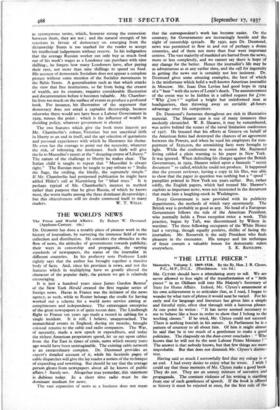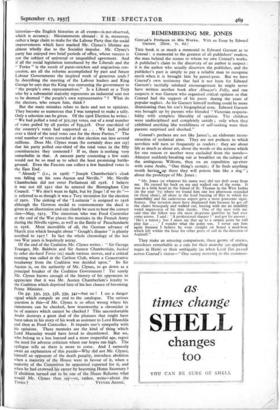" THE LII ILE PIECER "
Memoirs. Volume I. 1869-1924. By the Rt. Hon. J. R. Clynes, P.C., M.P., D.C.L. (Hutchinson. 12S. 6d.) Mx. GLYNES should have a stimulating story to tell. We are never allowed to lose sight of the transformation of a " little piecer " in an Oldham mill into His Majesty's Secretary of State for Home Affairs. Indeed, Mr. Clynes's amazement at his own achievement is so articulate that, as I read, I began to wonder by what turn of phrase it would next be varied. For his early zeal for language and literature has given him a simple and forceful style, often shot through with a lustrous phrase. At one point he writes : " It has never seemed necessary to me to behave like a boor in order to show that I belong to the working classes." If he tried, Mr. Clynes could not succeed. There is nothing boorish in his nature. In Parliament he is a pattern of courtesy to all about him. Of him it .might almost be said that he is too much of a gentleman to make a good politician. The rhapsody on the dust-cover concludes : " Who knows that he will not be the next Labour Prime Minister ? " The answer is that nobody knows, but that few things are more improbable. But that does not diminish Mr. Clynes's distinc- tion.
Having said so much I sorrowfully find that my eulogy is at an end. I had every desire to enjoy what he wrote. I wish I could say that these memoirs of Mr. Clynes make a good book. They do not. They are an uneasy mixture of narrative and propaganda. The constant violence of his writing is startling from one of such gentleness of speech. If the book is offered as history it must be rejected at once, for the first rule of the historian—the English historian at all events—is not observed, which is accuracy. Misstatements abound : it is, moreover, rather a large claim to make for the Labour Party that the social improvements which have marked Mr. Clynes's lifetime are almost wholly due to the Socialist impulse. Mr. Clynes's party has enjoyed two brief periods of office, whose success is not the subject of universal or unqualified agreement. And if all the social legislation introduced by the Liberals and the " Tories " is the result of panic-stricken and ungracious con- cession, are all the reforms accomplished by past and future Labour Governments the inspired work of generous souls ? In describing the meeting of the Labour leaders and King George he says that the King was entrusting the government to " the people's own representatives." Is a Liberal or a Tory who by a substantial majority represents an industrial seat not to be deemed " the people's own representative " ? What do the electors, who return him, think ?
But the main mistakes relate to facts and not to opinions. They become so numerous that I was tempted to make a tally.
Only a selection can be given. Of the 1906 Election he writes : " We had polled a total of 325,195 votes, out of a total number of votes polled by all parties of 859,518. Over one-third of the country's votes had supported us . . . We had polled over a third of the total votes cast for the three Parties." The total number of votes recorded at that election ran into several millions. Does Mr. Clynes mean (he certainly does not say) that his party polled one-third of the total votes in the fifty constituencies they contested ? If so, there is nothing very remarkable in that. A nascent party contesting a few seats would not be so mad as to select the least promising battle- ground. Even the Fascists can collect a few hundred votes in the East End.
" Already " (i.e., in 1906) " Joseph Chamberlain's cloak was falling on his sons Austen and Neville." Mr. Neville Chamberlain did not enter Parliament till 1918. I believe it was not till z911 that he entered the Birmingham City Council. " We don't want to fight, but by Jingo ! if we do "- is referred to as though it was a Tory invention for the election of 191o. The sinking of the Lusitania ' is assigned to 1916 although the German medal to commemorate the deed is given in an illustration and can clearly be seen to bear the correct date—May, 1915. The statesman who was Food Controller at the end of the War places the mutinies in the French Army
during the Nivelle regime, as well as the. Battle of Passchendaele in 1916. Most incredible of all, the German advance of March 21st which brought about " Gough's disaster " is plainly ascribed to 1917 ! In fact the whole chronology of the last two War years is hopelessly astray.
Of the end of the Coalition Mr. Clynes writes : "Sir. George Younger, Mr. Baldwin and Sir Austen Chamberlain, backed by other die-hard Tories (sic) made various moves, and a critical meeting was called at the Carlton Club, where a Conservative breakaway from the Coalition was decided upon." So Sir Austen is, on the authority of Mr. Clynes, to go down as a principal breaker of the Coalition Government ! Yo surely Mr. Clynes knows enough of the history of his opponents to appreciate that it was Mr. Austen Chamberlain's loyalty to the Coalition which deprived him of his last chance of becoming Prime Minister.
On Pp. 330, 333, 338, 339, 341—but no ! I see a danger signal which compels an end to the catalogue. The serious question is this—if Mr. Clynes is so often wrong where his statements can be checked, how trustworthy a chronicler is
he of matters which cannot be checked ? This uncomfortable doubt destroys a great deal of the pleasure that might have
been taken in his story of his work as assistant to Lord Rhondda and then as Food Controller. It impairs one's sympathy with his opinions. These memoirs are the kind of thing which Lord Macaulay would have loved to disembowel. But we,
who belong to a less learned and a more respectful age, regret the need for adverse criticism where our hopes ran high. The epilogue tells us there is more to come. And I earnestly await an explanation of this puzzle—Why did not Mr. C,lynes', himself an opponent of the death penalty, introduce abolition when a majority of the House were in favour of it, when a majority of the Committee he appointed reported for it, and when he had crowned his career by becoming Home Secretary ?
If abolition turned out to be one of the Hoare Reforms what would Mr. Clynes then say—or, • rather, write—about the











































 Previous page
Previous page